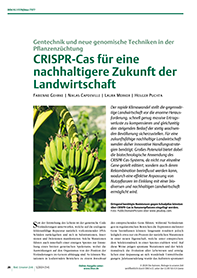CRISPR-Cas for a more sustainable future in agriculture
DOI:
https://doi.org/10.11576/biuz-7577Keywords:
CRISPR-Cas, Pflanzenzucht, genome editing, Klimawandel, Nachhaltige LandwirtschaftAbstract
For thousands of years, selective breeding has greatly impoverished the genetic diversity of our old cultivars so that an adaptation to the ever more rapidly changing climatic and demographic conditions through conventional breeding methods is increasingly difficult. Hence, innovative strategies are needed to maintain crop yields under adverse conditions without impairing biodiversity thus ensuring food security for the ever-growing world population. Enabling the precise and easy adaptation of crops, CRISPRCas-based genome editing strategies offer great potential for shaping the future of global agriculture sustainably. Not only can single genes be specifically edited, but linkage groups can be modified, too, by precisely inducing translocations and inversions, and new recombination events can be obtained. Therefore, genetic variability of cultivars can be increased, which is the basis for sustainable crop breeding. However, it remains to be seen whether legal regulations and customer acceptance will recognize the potential of the biotechnological application of the CRISPR-Cas system in agriculture and enable the sustainable mastery of future challenges.

Downloads
Published
How to Cite
Issue
Section
License
Copyright (c) 2024 Fabienne Gehrke, Niklas Capdeville, Laura Merker, Holger Puchta

This work is licensed under a Creative Commons Attribution-ShareAlike 4.0 International License.

